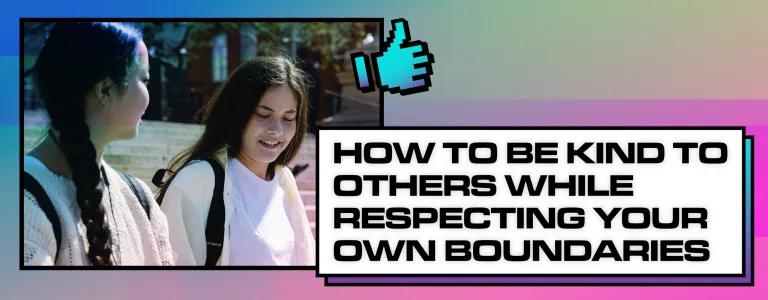
How To Be Kind To Others While Respecting Your Own Boundaries
By Writers' Club member Yasmin.
Have you ever found yourself saying, “Okay sure” or “It’s fine don’t worry” when someone asks you to do something, when in reality your insides are screaming at you in frustration because you just said yes (yet again!) to something you didn’t want to do. Then you may be suffering from what I call Wonky Empathy.
And if so, you’re not alone. For I too find myself suffering from Wonky Empathy — which is when we act from a place of wanting others to believe we’re empathetic, instead of being empathetic to the most important subject of all: ourselves.
So what causes Wonky Empathy? My take on it is that it comes from a low sense of self confidence and self-worth, and rather than focus on ourselves we try to be kind and nurturing to everyone else. It’s like we feel the need to constantly prove how understanding and accepting we are, in the hope that people won’t see us as the selfish, cold monster that our low self-esteem tells us that we are (spoiler alert: having boundaries and practising self-care doesn’t make us self-obsessed!).
If all of this sounds pretty familiar to you, then know that there are ways to overcome it. You can start to voice your feelings and boundaries in a healthy way, whilst still being a kind and loving person who has a big and caring heart.
Step 1 — Recognise why showing empathy is important to you
The dictionary describes empathy as ‘an ability to understand and share the feelings of another’.
We might love caring about caring. We may want to be that person everyone goes to for help, and be a safe space for them to share their feelings. This urge in us is often (not always, but often!) because we didn’t always receive the attention and care that we needed. And because of that, deep down inside us we recognise how painful it is not to receive it. So, very understandably, we overcompensate by readily giving it to others – it’s often much easier to show love and empathy to others, than it is to show it to ourselves.

Step 2. Check where the urge to show empathy is coming from.
When we notice ourselves saying yes to something we don’t want to do, we can check whether we are actually being caring — or whether our Wonky Empathy is showing up again. Sometimes we might truly want to do a kind thing for someone. Other times maybe we just want them to see us as a ‘good’ person. No matter how empathetic you are to others, if you don’t show care for yourself too, then you’re not allowing yourself to live an authentic life. So really try and notice where your urge to show care for others is coming from.
Step 3. Practice self-compassion.
As we look back on all the times when we said yes but wanted to say no, or when we allowed someone to take our kindness for granted, we might feel irritated or angry — either with the other person, or with ourselves. Maybe we ruminate for hours on all the things we could have, or should have, said or done. Standing in the shower, with devil hot water running down our face, maybe we think about how we wish we’d said that thing in that perfect way, wishing we were bolder, or more outspoken. But rather than beat ourselves up, or criticise ourselves, we can start to practise empathy and self-compassion to the person who needs it: us. So forgive yourself. Be kind to yourself. This is a tough world, and you’re doing the best you can.
Step 4. Notice your own boundaries.
As we reflect on all the moments of frustration, anger, hurt, and sadness of not being true to ourselves, we can often notice where our boundaries lie. We might notice boundaries that have been crossed, and what kind of boundaries we need to create. The more you delve into those moments, memories, and feelings, the angrier you might feel about allowing yourself to endure those scenarios. If you’re anything like me, you might feel like ripping yourself apart and putting yourself together with a mega strong superglue. But this practice of sifting through your emotions, and letting yourself experience them, takes courage. And determination. But if you can stick with it, even if only for a short while at a time, then you’ll start to gain more clarity about the boundaries you could implement next time you’re in a similar situation.
Boundaries are there to protect you, keep you from burning out, and to prevent people walking over you in life. The key to boundaries is that they revolve around YOU and your own actions, rather than trying to control the actions of someone else.

When it comes to overcoming Wonky Empathy, the boundaries we set for ourselves might look like:
- I will only say yes to helping someone else if I truly have enough emotional and physical energy to do so.
- I will take time each week to notice my own needs, and I’ll prioritise meeting those needs with the same care that I give to others.
- I’ll practise saying “No”, and reassure myself that it’s okay to do so. E.g. “I’d love to help you out tomorrow but I can’t take on more things at the moment. Let me know how it goes!” or “I appreciate the invitation, however I need some time to myself tonight. I hope you have fun and I’d love to come along next time!”
There are many ways to phrase boundaries, and word them empathetically, whilst still being assertive and confident in your own values and needs. Learning to set boundaries is a skill that gets easier with time. But relearning what it means to be empathetic, and starting to show yourself the care you show to others, is definitely a skill worth practising.




